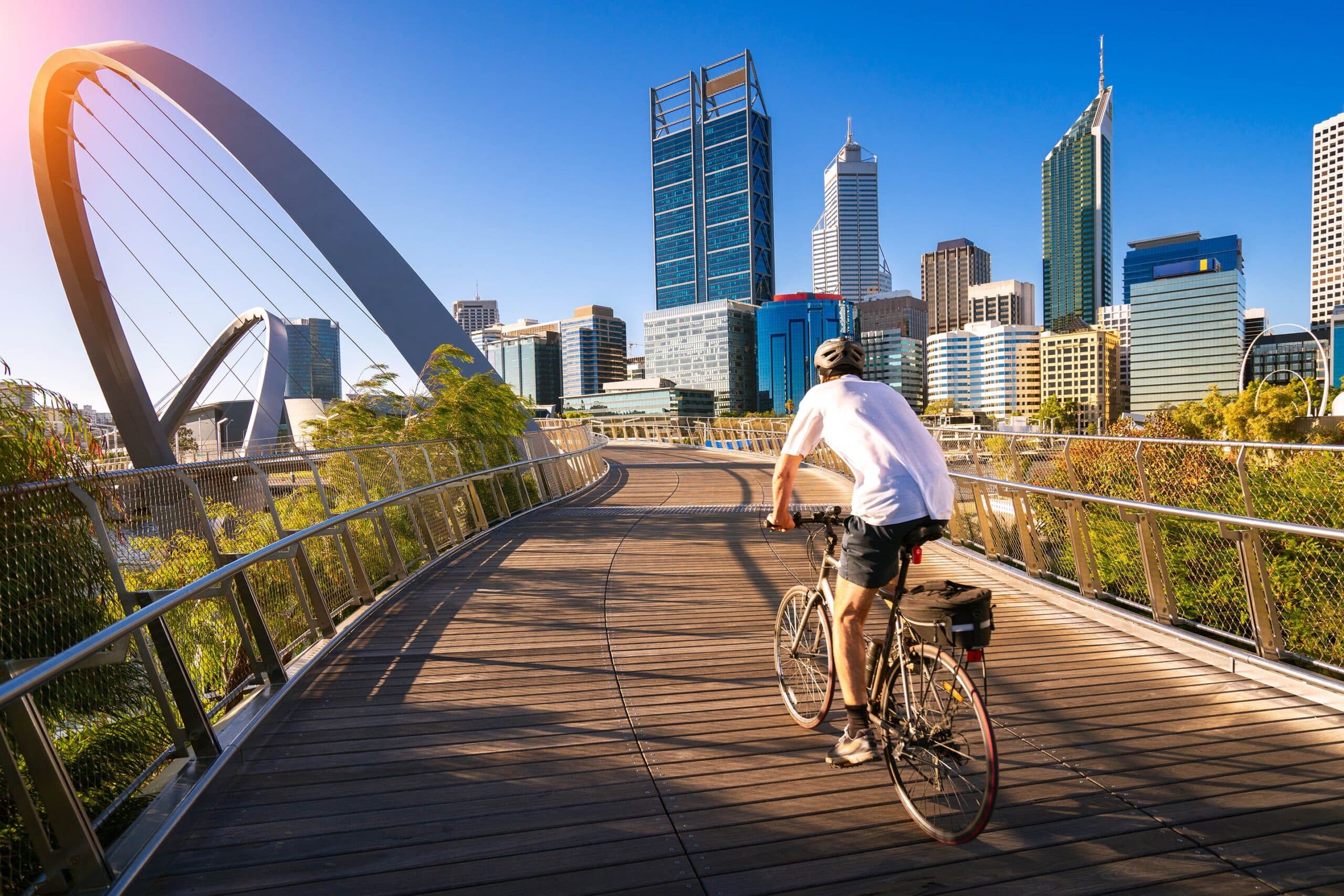Australia’s stunning landscapes, vibrant cities, and unique wildlife make it a dream destination for travellers. Once the holiday is over, you’re back in your own country.
But what if you could travel and work in Australia — and essentially have the best of both worlds?
The concept of working and travelling in Australia, often called a “working holiday,” has gained immense popularity among young explorers and career enthusiasts.
With an Australian working holiday visa, you’ll be able to live like a local, learn English and have the time of your life in a sun-kissed, far-away land Down Under.
Nothing would be better than an indefinite road trip around Australia and not having to work.
Sadly, the cost of travel in Australia and the size of the country means it’s not a reality for most people — something Nomadic Matt, the New York Times best-selling author, would agree with.
“I grossly underestimated how much I needed. It cost me double what I thought because of a strong Australian dollar and poor planning,” he writes in his blog.
“On my most recent trip, I spent US$3,400 in 33 days. It includes my day-to-day expenses, flights, transport, tours, and anything I bought. Averaging roughlyUS $100 a day, it would have been a lot more had I not been able to stay with friends and get discounted tours.”
Eating out can cost a hefty penny, where a cup of coffee can cost five Australian dollars, and a lunchtime meal can easily be over AU$20.
With such high costs, it makes even more sense to travel and work in Australia.
What’s more, Australia has one of the highest minimum wages in the world, currently at .
Even with the relatively high cost of living, this should be enough to break even if you’re considering living it up in Sydney, Melbourne, Perth or any of Australia’s other big cities.
 With a working holiday visa in Australia, you can work as a bartender, among other jobs.
With a working holiday visa in Australia, you can work as a bartender, among other jobs.
Pro tips for working in Australia
The first thing you need to know is that you need to secure your work visa — but not your employment — in advance. This means you need to coordinate your application for an Australian working holiday visa before landing there.
If you’re under 30 — or 35 in some cases — and hold a passport from an eligible country, you need to apply for the First Work and Holiday visa. This visa allows you to have an extended holiday in Australia as well as to work here to help fund your trip.
The visa fee is AU$635; if granted, you can stay for a year and do any work you want.
Australia’s working holiday visa has made it an attractive destination for long-term travellers for years. This visa gives you the freedom to work in most sectors or jobs. Employers are used to taking on backpackers for work in hospitality, retail, tourism, construction, farming and more.
Take 22-year-old Japanese university student Yushin Tanaka, for example. Tanaka took a year off from university and flew to Australia on a working holiday visa. He works as a server at an Italian restaurant four days a week.
“I’m grateful that I can cover initial expenses with the money I earn from working,” he said. “I want to make use of what I learn here and of my English skills after returning to Japan.”
The best part? You can work anywhere in Australia as your visa isn’t attached to employment for a single organisation or company.
Whether you’re a recent graduate looking for a gap year adventure, a professional seeking international experience, or simply an adventurer at heart, here are five easy ways that can land you a job while you travel in Australia.
 Working holiday visa programmes have long attracted the wanderlusters seeking to travel and work in Austrlaia.
Working holiday visa programmes have long attracted the wanderlusters seeking to travel and work in Austrlaia.
5 easy ways to travel and work in Australia
1. Join a working holiday support programme
One effective way to secure a job on your Australian working holiday is to use a Working Holiday Support Programme.
These work programmes can assist international travellers in finding employment and settling into Australian life seamlessly.
Among the providers are The Global Work & Travel Co., Work N Holiday and Alliance Abroad, which provide guaranteed work opportunities for working holidaymakers throughout the duration of their stay.
These programmes often include airport pick-up, an induction to help you get established, support in finding housing and social activities.

If you want to travel and work in Australia, start by knowing the visas you need to apply for.
2. Conduct an online job search
Several powerful tools – online and otherwise – can help you secure a job on your working holiday.
You can check out job search websites in Australia designed for backpackers or use popular platforms like Seek and Indeed.
When using these websites, focus on looking for short-term or contract jobs, as they are more likely to hire working holiday visa holders.
Apart from that, keep an eye out on Facebook’s Job Search tool, join industry groups, or check LinkedIn for positions; social media can be a fantastic tool for finding work with up-to-date listings.
Wait, there’s more. With the right skills and a good WiFi connection, many jobs can be done from anywhere.
So, if you’re a freelancer in your home country, why not use your skills to work and travel around Australia? Some of the top freelancing sites include Fiverr, Upwork, and Freelancer.com.
 Meeting potential employers in person can be a great way to secure jobs, especially in hospitality.
Meeting potential employers in person can be a great way to secure jobs, especially in hospitality.
3. Meet potential employers face to face
If you prefer to start looking for a job after arriving in Australia, meeting employers in person can be an excellent way to find work, especially in bars and restaurants.
You can walk around and visit these places to check if they need bartenders or servers.
Just remember that if you are serving alcohol, you’ll need to complete Responsible Service of Alcohol (RSA) training and get an RSA Certificate, as it’s a requirement in Australia.
It might seem like a slower way to find a job, especially in a world where we’re used to finding everything online. However, this way, you can explore a new city, connect with locals, and start conversations with potential employers.
Make sure you have a few CVs at the ready.

Want to travel and work in Australia? Try asking temp agencies — they can link you to cafes and restaurants needing help.
4. Enlist a temp/recruitment agency
If you need help with your job search, a temp/recruitment agency can be a helpful place to turn. They can help you find jobs that match your skills, apply for positions you like, and get hired.
Here, you can find temporary jobs lasting anywhere from just one day for emergency cover to as long as three to six months, such as maternity leave replacements.
Temp agencies are typically used to fill these positions, especially in city areas, quickly.
Since these roles are often more corporate and you’re stepping in temporarily, you can expect to earn higher than the minimum wage.
Some agencies, like The Kingsmen, specialise in industries like hospitality and construction, which are great for people who love to travel or are on working holidays.
 Networking with fellow travellers can lead to some of the best job opportunities during your working holiday in Australia.
Networking with fellow travellers can lead to some of the best job opportunities during your working holiday in Australia.
5. Find work as you travel
One of the greatest perks of a working holiday is the freedom it offers.
If you’re adventurous and eager to explore different parts of Australia, you can find work as you travel. Job opportunities can pop up unexpectedly, so listen for any leads in your hostel and watch for job ads.
If someone in your dorm has recently completed farm work, they might have useful farm work contacts to share. Strike up conversations, express your interest, and see where it leads – you never know what opportunities may come your way.
The Australian government has put together a Harvest Guide for travellers interested in assisting with picking, harvesting, and gathering produce in the country’s charming rural farming towns.
It’s an excellent resource for those looking to experience the beauty of Australia’s countryside while working.
You can even check if your hostel has any job openings. Hostels often serve as great hubs for backpackers, and they may have various flexible job options available, including part-time or full-time roles.
Take “Wake Up! Hostels” as an example. They’re constantly searching for enthusiastic individuals to join their team.
You could find roles in reception, housekeeping, maintenance, or even become a tour guide, leading social activities like city and beach walks and market tours.

One of the most effective ways to travel and work in Australia is to use a temp agency.
Tips for a successful work and travel in Australia experience
A successful work and travel experience in Australia requires careful planning.
Here are some tips to make the most of your adventure:
- Research: Thoroughly research Australia’s visa requirements, job prospects, and cultural aspects.
- Budgeting: Create a realistic budget to manage your finances throughout your stay.
- Safety: Prioritise safety and be aware of local guidelines and emergency contact information.







